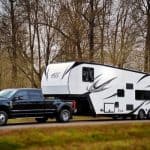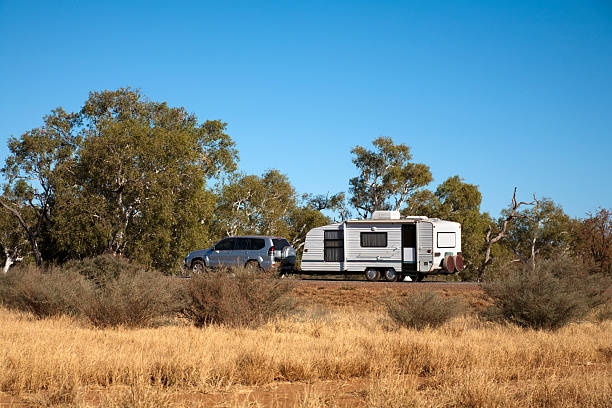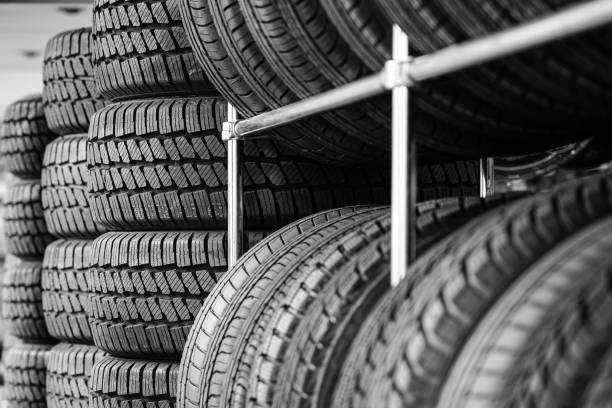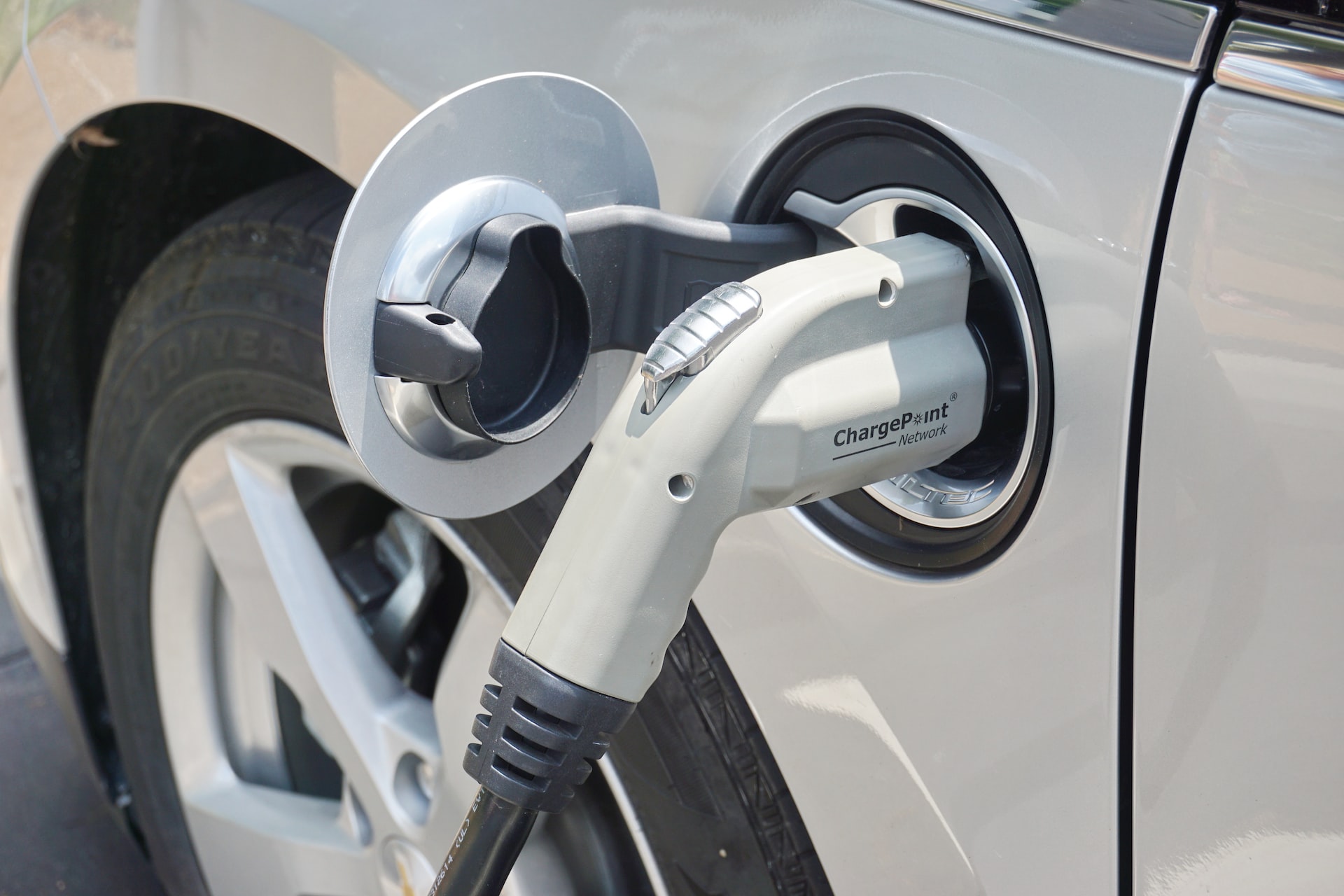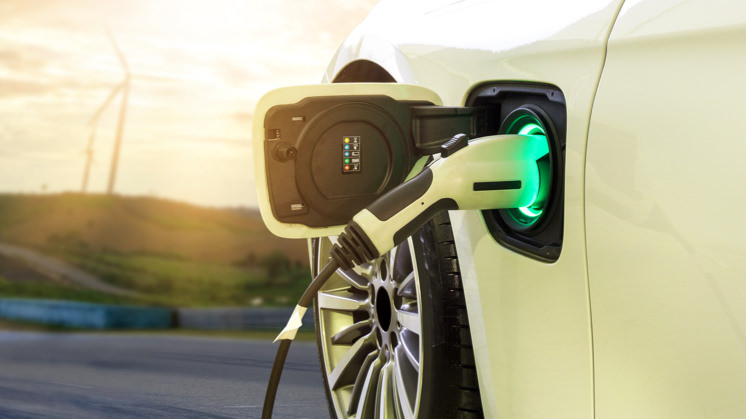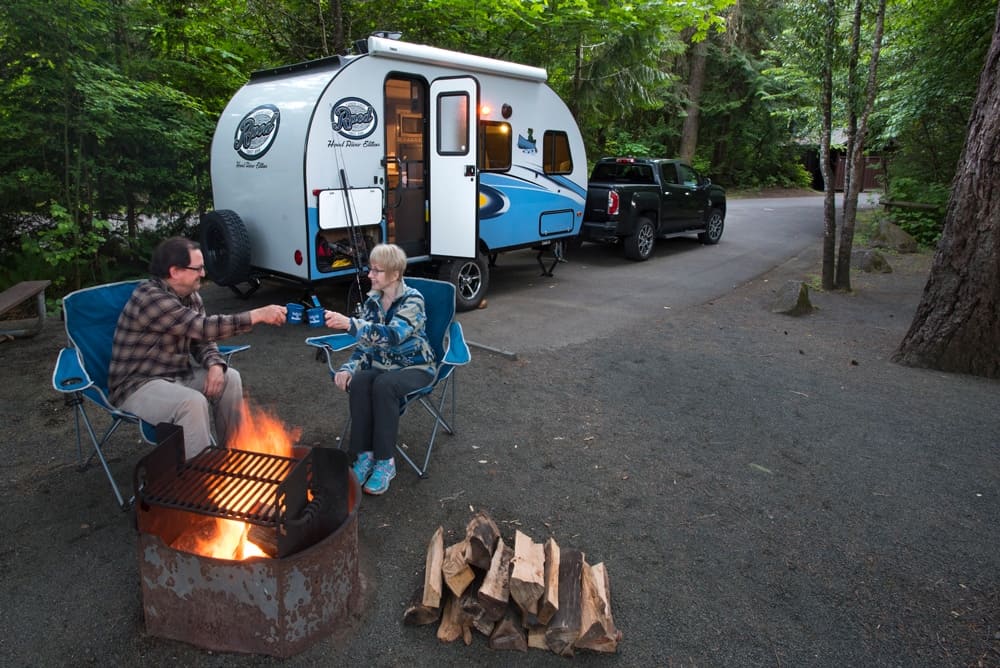
With baby boomers, millennials and Gen-X’ers, all increasingly participating in the “RV- lifestyle,” the Recreational Vehicle market has positively exploded, growing more than 200 per cent since 2009, or more than USD 42.5 billion in 2019. Did you know about this before reading the R Pod trailer review?
Moreover, it is set to expand at a compounded annual rate of over 7% from 2020 to 2026 (certainly if taxes remain low and America can get back to that 3% GDP growth rate). However, manufacturing in 2019 saw a YOY dip of 2.1% as compared to 2018.
Some of the factors impeding the potential growth in the sector are:
High initial purchase cost: One of the major factors restricting the market growth in the recreational vehicle industry is the high initial purchase cost of motorhomes and travel trailers.
Innovation & customization: Innovative & high-quality materials used to reduce the weight of recreational vehicles along with the customization of interior & exterior features contribute significantly to the overall vehicle cost.
Cost of ownership:Ownership of motorhomes and travel trailers entails payments towards road tax and insurance-related expenses, which increases the value of ownership significantly.
High maintenance costs: Constant maintenance and replacement of batteries and refilling gas in power generators incur high expenses and amount to high operating costs which eventually hinders the industry growth.
Impact of COVID-19: Like everything else, the recreational vehicle market will also suffer the consequences of the COVID-19 pandemic, as industry experts are foreseeing, the market will face a standstill. The sluggish growth is mostly due to the severely wounded tourism sector combined with the decreasing purchasing power of consumers across the globe. The spread of the deadly virus, travel bans, lockdowns, and the ensuing uncertainty have made people wary of going outdoors in order to stay safe travel and tourism, and recreational vehicle sales.
Role of Towables in the RV Industry
The towable RVs segment accounted for about 45% market share in 2019 and is predicted to attain a turnover of USD 28 billion by 2026. This surge in the towable RVs demand can be credited to their low cost as compared to motorized RVs and the absence of a built-in engine & powertrain.
RV owners have the choice to use an existing truck or a van to tow the ultra-lite trailer, cutting down the on-road cost of the vehicles significantly.
Travelers are looking for more authentic experiences. The realization that you don’t actually need a ‘home away from home’ for your off-the-grid vacation is slowly setting the tone for a departure from the standard 30-foot hard-sided travel trailers with an electric fireplace, washer/dryer, or indoor plumbing. A small, compact easy-to-handle trailer is all that you need to enjoy your outdoor adventure.
R-Pod
In a very short time, R-Pod trailers have made an impression within the RV industry’s ultra-lite towable sales market. Though considered an ultra-lite trailer by many and not a teardrop, Forest River, the industry leader, and the name behind the R-Pod considers it to straddle both the categories. When Forest River first introduced its R-Pod travel trailer in 2008, it became an instant hit.
The R-Pod comes along with thirteen floor plans and layouts with lengths between 18’4″ and 22’2″. Eleven of the variants include a slide and many units come with an option called the R-Dome, a screened awning room. The chassis is made from a powdered coated steel frame holding a one-piece, seamless fiberglass roof unit. Features include a gas/electric DSI hot water heater, a 3.7 cubic foot 3-way refrigerator (Gas, Electric, 12V), a 2-burner stove, a 20,000 BTU furnace, shower, and toilet.
A few of the R-Pod travel trailers offer a pop-out tent area made of Aqualon™ which is a robust, yet breathable material that remains flexible whatever the climate, and is not affected by mold and mildew. Some models also offer a rear garage option, very similar to a tailgate, which provides outside entertainment. Each garage R-Pod model includes flat-screen LED TV, outdoor speakers, sink, storage, and a grill.
Forest River: The Company Behind R-pod
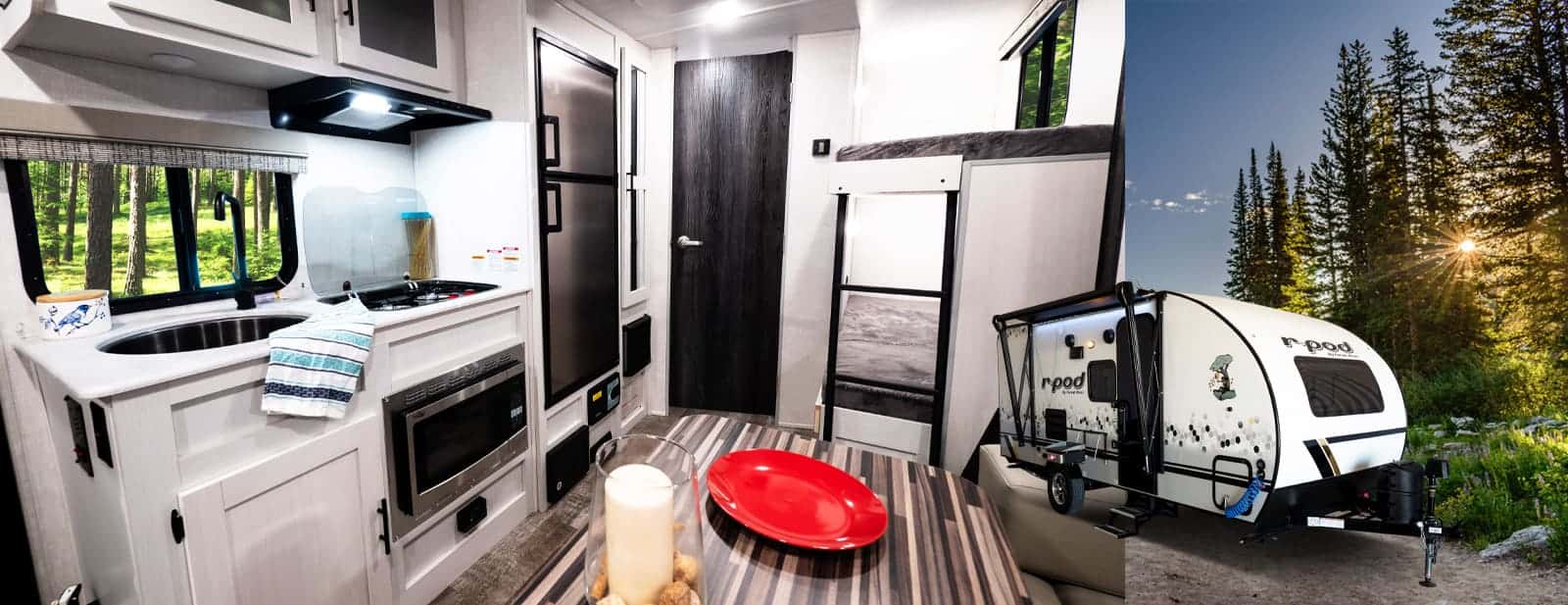
Forest River is one of the biggest RV makers in the world, with more than 100 production sites, currently. The company has been a manufacturer of a wide selection of vehicles, recreational vehicles, utility trailers, pontoon boats, cargo trailers, and buses, for more than two decades. Over the past two decades, the company has managed to roll-out an amazingly endless lineup of RVs, from small pop-ups for individuals and couples, to imposing fifth-wheels and motorhomes made for full-time travel.
Peter Liegl founded the company in 1996, and it expanded operations primarily through acquisitions in its early days. One of the recent acquisitions was of Coachmen RV, an ancillary of All-American Group. Forest River has built a name for churning out an RV for every need and at all price points.
With headquarters in Elkhart, Indiana, the manufacturing hub for the US recreational vehicle industry, Forest River was acquired by Berkshire Hathaway in 2005.
Forest River RV remains one of the largest RV manufacturers in North America and makes a variety of RVs including Class A motorhomes, Class C motorhomes, travel trailers, fifth wheels, and toy haulers. The company has built a name for creating an RV for every need and at all price points.
The leading name has been two steps ahead of the competition, building numerous production facilities in the Midwest and West coast.
Forest River has positioned itself as a lifetime and aspirational brand with its aim being that a first time RV buyer can start with the company’s ultra-lite R-Pod and, in the course of years, move up to one of the company’s flagship Class A coaches, all without ever leaving the Forest River brand. Never the one to shy away from trying a new idea, new models are launched very regularly and cast aside with alarming alacrity if sales aren’t up to the mark.
With one of the most extensive RV dealer networks in the United States, Forest River is a favored choice for many. Most often, for no other reason than their staggering market presence. Forest River also has a number of auxiliary entities under its very large canopy (Coachmen, Dynamax, Palomino, Shasta, Primetime, and Viking, to name a few), which results in many RV customers ending up buying a Forest River recreational vehicle without even realizing it.
The company has had a lot of success with sales at both ends of the RV spectrum, in the last few years. On the one hand, the company’s motorhomes have sold exceedingly well, and at the same time, the market share of their smaller campers has grown exponentially, especially the R-Pod. Other sought-after models are Berkshire, Charleston, Georgetown, Lexington, Rockwood, Cardinal, Flagstaff, Cedar Creek, Wildwood, XLR, and the Sunseeker.
The R-Pod is marketed as a cost-effective luxury at the least tow weight in its class. Its small size makes it easier for towing while still offering spacey functionality on the road and while camping.
Let’s do an in-depth analysis to find out more about this little camper.
Quality
The unique design of R-Pod by Forest River sets it apart from other trailers on the market. Its teardrop silhouette pierces through the wind and makes it easier to tow compared to other box-shaped campers on wheels.
A distinct aspect of R-Pod’s construction is the use of Azdel, a compound created with a mix of polypropylene and fiberglass, resulting in a strong, lightweight, and odorless material. It demonstrates double the insulation properties of wood, strong resistance to noise, weather, and temperature, and is environmentally friendly as well. This helps keep the R-Pod cool in the summer, warm in the winter, and nice and quiet even in locations with lots of ambient noise.
The R-Pod uses aluminum framing around every RV opening that provides unparalleled structural integrity. Every window opening, compartment door, and other openings are framed with aluminum. The windows have automotive seals and no gaskets, which do not need servicing in the future.
R-Pod’s roof is not rubber, but a one-piece fiberglass sheet that runs from the front to the rear wall bottom of the trailer. There are no seams in the front or the back for water to get through.
The R-Pod uses an aluminum-laminated floor with built-in grooves to lay the wiring. Each R-Pod is checked for leaks with a seal tech machine to ensure a tight seal fit.
Features and Floorplans
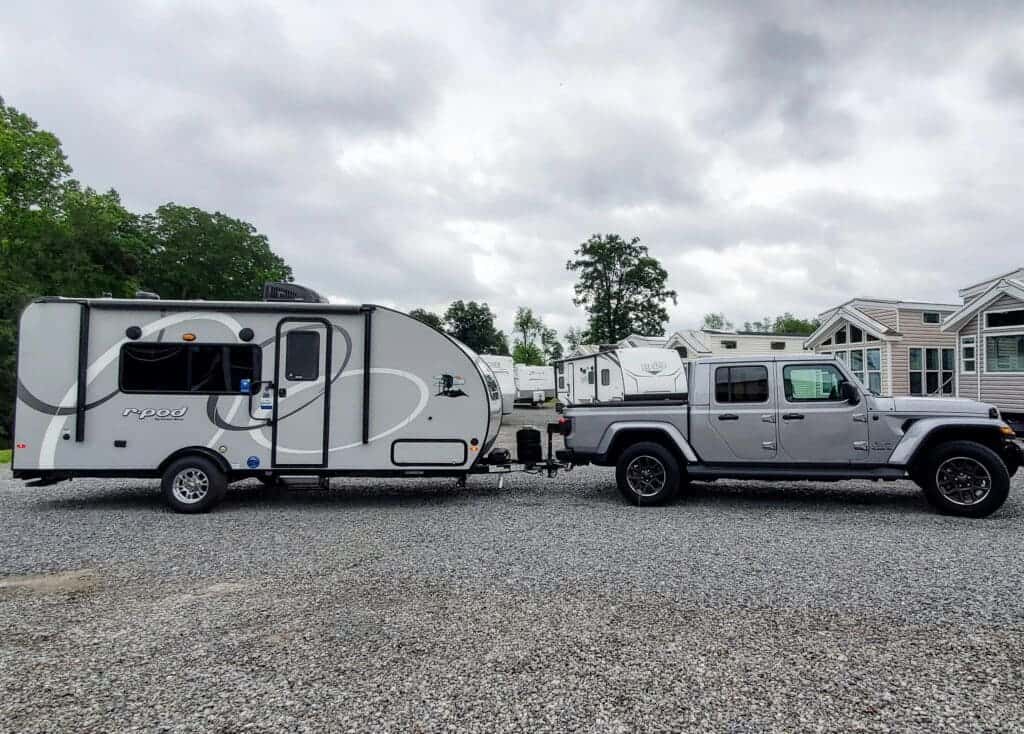
There are a number of impressive features that are standard with the R-Pod, and you can always choose from the extra options available.
Most R-Pod models carry a Thule powered awning with an inbuilt LED light strip. Thule is famous for manufacturing lightweight but robust awnings.
Storage areas also have expandable cargo netting, which comes in handy to keep things in place and organized, even when the shape is non-standard.
The roof-mounted solar prep is standard with all R-Pod models. You also have the option to choose the solar package available with every model, that includes a 110W solar panel, digital controller, and 1000-Watt inverter.
Every R-Pod model comes with the same water tanks that have these capacities: freshwater, 36 gallons; grey water, 30 gallons; black water, 30 gallons.
If you like to travel with a furry friend, R-Pod is considered pet-friendly and includes pet bowls, pet leash connections, and outside showers in every model.
The kitchen comes with a standard 3-way refrigerator, cabinets, and hardwood drawers. If you have opted for an outside kitchen with your model, it comes with a two-burner cooktop and a spray port with a dry sink, all of which are completely removable.
Other features you can opt for are a convection microwave in the kitchen, a 13.5K BTU air-conditioner, and a 24-inch LED flat-screen TV.
The R-Pod is available in a total of 11-floor plans, in weights ranging from 2,342 lbs. to 2,839 lbs. The exterior length measures between 18’4″ and 20’4″.
For all models, the exterior width is 8′, and the exterior height with the A/C unit is either 9’6″ or 9’7″.
Rear kitchen, bunk beds, a model without slides, rear bathroom, a sofa instead of the dinette. Whatever you are looking for in a travel trailer, R-Pod will surely match your preferences. R-Pod has a load of great options, and the interior choices available are simply brilliant for such a small travel trailer.
Interiors
The R-Pod travel trailer is suitable for singles, couples, or even couples with small children. The options in layouts are sufficiently varied to suit different needs and likes.
Being a small camper, a lack of internal storage is an issue. There have also been complaints about the lack of easy access to the storage under the seating. Uncomfortable dinette has been another concern. Replacing the dinette with the sofa is a popular choice, so is the rear kitchen.
Exteriors
A vital facet of the R-Pod is the exterior aesthetics. While the generous use of decorative stickers is not everyone’s cup of tea, the majority of RV owners love the look of this small, aerodynamically-built travel trailer.
There have been some complaints about interior storage as discussed earlier by me, but at the same time, exterior storage has been a big USP of the R-Pod. In almost all the models, there is a pass-through storage space, mostly in the rear, and at least two. These exterior storage sections are spacious and easily accessible, unlike the interior one.
Again, as mentioned earlier, R-Pod is easy to haul as it is lightweight and can be pulled easily by even small crossovers and SUVs even in tight spots or twisting roads. Not only is the R-Pod easy to tow, but also extremely simple to set up. This makes it even more appealing and ideal for solo travelers and couples too.
Another feature that scores points with the customers is the outdoor shower that comes with hot water, and also the ample tank capacity for a trailer of this size. These are some of the features that add to the experience and make it more enjoyable for the user.
Perquisites
One of the additional perks you can enjoy with the purchase of an R-Pod is the full year of 24/7 emergency roadside assistance that Forest River offers to its customers. The roadside assistance includes towing, jump-starts, tire changes, fluid delivery, lockout service, winch-out, mobile mechanic, technical support, and dealer locator services.
For safe storage solutions, Forest River has two covers available, based on the R-Pod model you own. Both these covers carry a limited lifetime warranty and can also be adjusted for a made-to-measure fit and have click-close straps, zippered access, and a storage bag for the cover when not in use.
Another perk that comes with owning an R-Pod is the membership of FROG (Forest River Owners’ Group). The group is made up of over 125,000 Forest River and other affiliated brand RV owners from all across the United States and Canada. The vibrant group organizes events and has its own website.
Warranty and Repair Work
All towable RVs from Forest River offer a one-year limited warranty. For the conditions of the contract to apply-unlike with other companies-the purchase needs to be made from an authorized Forest River dealer. Normal wear and tear are, as usual, excluded from the provisions of the warranty.
Any Forest River RV dealer can repair the R-Pods. It’s essential to keep in mind while buying a travel trailer that you’ll need to deal with the dealership rather than with the company or corporate office.
It would be a good idea to buy from a reputable authorized dealer in your area. This will save you a lot of time and trouble if any repair work needs to be carried out on your travel trailer at any stage.
Some Sticky Issues

One of the most frequent complaints likely to hear from R-Pod owners is the general quality of workmanship and finish, specifically on brand new trailers. Some users, over time, have complained about issues with loose screws and markings.
As far as RVs are concerned, any kind of leaking, if undetected or unchecked, can quickly spread and become a major headache. That’s why it is essential to check RVs routinely for leaks to make sure that leakages are discovered and repaired promptly before the damage becomes extensive.
Minor issues like the factory hoses for the water tanks being too short for many hookup areas have also come up, which can be solved by replacing these hoses immediately with longer ones.
But mostly, a majority of customers found the R-Pod to be well built and say it heats and cools well, making for a comfortable trailer even in inclement weather.
Concluding Remarks
R-Pod is an affordable, entry-level recreational vehicle, with a lot going for it. Since its launch in 2008, it has managed to shake up the ultra-lite RV segment with its looks and functionality. Of course, it’s not an aspirational or luxury product, and it does leave a lot to be desired in terms of its build quality sometimes. And it will always be an RV just for singles or even couples.
The big travel trailers and fifth-wheel RVs will still rule the roost when it comes to family vacations in the big outdoors. But there’s no doubt that the R-Pod has managed to carve a niche with its ease-of-use, its variety in floorplans, and its charming design. After being in the doldrums because of the Covid-19 pandemic, hopefully, R-Pod along with the entire RV industry will see a revival in next year.

